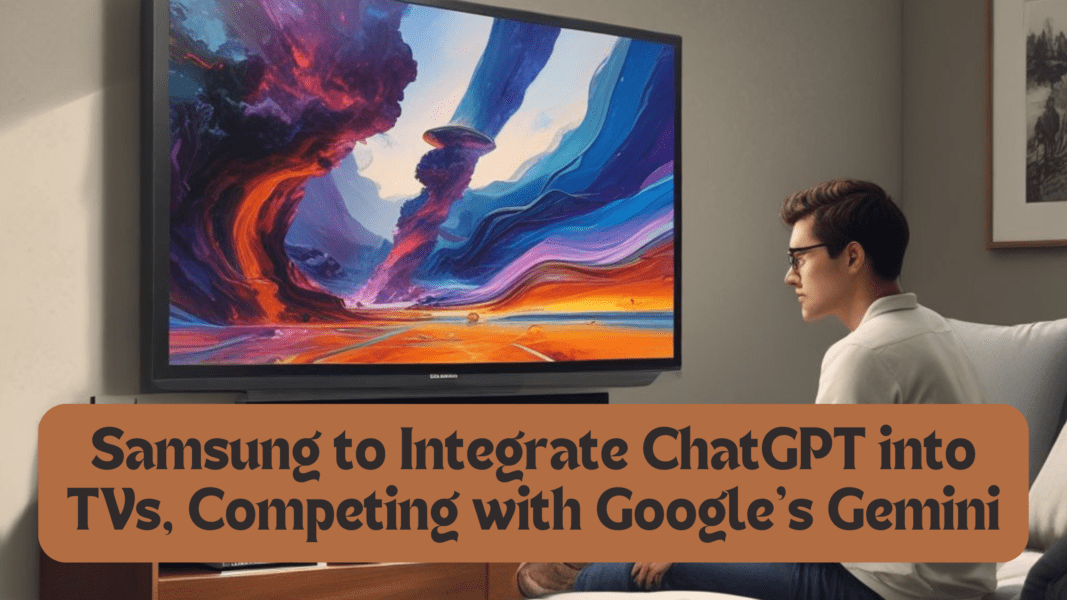Samsung is reportedly working with OpenAI to integrate ChatGPT into its smart TV ecosystem, setting the stage for a next-generation entertainment experience. The move positions Samsung to compete directly with Google, which recently announced the inclusion of its Gemini AI in the Google TV operating system. With these developments, the battle for AI-powered TVs is heating up, promising to redefine how we interact with our television screens.

ChatGPT Integration: What It Means for Samsung TVs
A Korean website has reported an “open partnership” between Samsung and OpenAI aimed at embedding ChatGPT into Samsung TVs. While there’s no indication of new hardware, the collaboration will likely focus on software integration within Samsung’s Tizen OS platform.
Samsung has already introduced several AI-driven features, such as AI Upscaling, AI Sounds, and its new Vision AI, unveiled at CES 2025. These features enable Samsung TVs to offer live translations, recognize dishes on-screen, and suggest recipes through the Samsung Food app. Incorporating ChatGPT could take these capabilities to the next level, offering personalized interactions that go beyond simple voice commands.
Also Read: Google Unveils Gemini 2.0: The Reasoning AI Model’s First Steps
Why the Move Makes Strategic Sense
The timing of this collaboration is notable, as Google is set to release its next-generation Google TV system with Gemini AI later this year. Google TV, an upgrade to Android TV, offers features such as voice-activated controls, personalized content recommendations, and the ability to ask questions about on-screen content using AI.
By integrating ChatGPT, Samsung is ensuring its TVs remain competitive. This partnership could also benefit OpenAI, giving ChatGPT a prominent role in home entertainment systems and expanding its user base beyond mobile and desktop platforms.
The Evolution of AI in TVs
AI in Google TV
Google’s Gemini AI, announced at CES 2025, offers robust capabilities, including real-time questions about YouTube videos, advanced content recommendations, and seamless voice control. For example, you can ask Gemini to identify an actor in a movie or provide detailed background information about the content you’re watching.
Samsung’s Vision AI
Samsung’s Vision AI is already a significant step forward in AI integration for TVs. It can analyze what’s on the screen to provide relevant suggestions, such as recipes or real-time translations. ChatGPT integration would further enhance this, enabling more natural conversations and intelligent assistance.
Also Read: The AI Race: Google and OpenAI Compete with Groundbreaking Releases
The User Experience: Talking to Your TV
For many users, the idea of directly interacting with a TV through voice commands is exciting. Here’s how ChatGPT could enhance everyday TV usage:
- Simplified Searches: Ask ChatGPT to find a movie, show, or specific content on streaming platforms.
- Instant Answers: Wondering who an actor is or where you’ve seen them before? Just ask your TV.
- Task Automation: Schedule recordings, set reminders, or even control smart home devices linked to your TV.
- Eliminate the Remote: With voice commands, the days of searching for a misplaced remote could be over.
Potential Challenges
While the integration of AI into TVs offers numerous benefits, it’s not without challenges:
- Privacy Concerns: Allowing an AI system to access user data and monitor activity could raise security questions.
- Accuracy Issues: Early implementations of AI systems sometimes provide incorrect or incomplete responses, which could frustrate users.
- Hardware Limitations: Advanced AI capabilities may require more processing power, raising questions about compatibility with older TV models.
Also Read: OpenAI Unveils o3 Reasoning Models Amid AI Arms Race
When Will We See AI-Powered Samsung TVs?
The rollout timeline remains unclear, but with Google TV expected to hit the market in late 2025, Samsung’s collaboration with OpenAI might follow a similar schedule. Given Samsung’s history of innovation in smart TVs, an announcement could come sooner than anticipated.
FAQs
1. What is Samsung’s partnership with OpenAI about?
Samsung is working with OpenAI to integrate ChatGPT into its TVs, offering advanced AI capabilities for personalized user interactions.
2. What features will ChatGPT bring to Samsung TVs?
ChatGPT could enable conversational voice commands, personalized content recommendations, real-time answers about on-screen content, and more.
3. How does this compare to Google’s Gemini AI?
Both ChatGPT and Gemini aim to enhance user interaction with TVs. Gemini offers seamless integration with Google’s ecosystem, while ChatGPT will likely leverage OpenAI’s conversational strengths.
4. When will ChatGPT-powered Samsung TVs be available?
While no official release date has been announced, a late 2025 rollout seems likely, aligning with Google TV’s release.
5. Will ChatGPT work on existing Samsung TVs?
Compatibility will depend on hardware requirements. Samsung may roll out the feature on newer models with the processing power to support advanced AI functions.
6. Are there privacy concerns with AI-powered TVs?
Yes, users may worry about data collection and monitoring. Companies will need to implement strong privacy protections to address these concerns.
7. How does ChatGPT enhance the viewing experience?
It simplifies content searches, provides instant answers, and automates tasks like recording shows or controlling smart home devices.
8. Can ChatGPT help with apps like YouTube?
Yes, similar to Gemini AI, ChatGPT could provide insights and answer questions about videos on platforms like YouTube.
9. What other AI features does Samsung offer?
Samsung’s Vision AI provides real-time translations, content recognition, and suggestions for recipes based on on-screen visuals.
10. Will Samsung’s AI TVs replace traditional remotes?
Voice control could significantly reduce the reliance on remotes, but traditional controls will likely remain as a backup.
.

